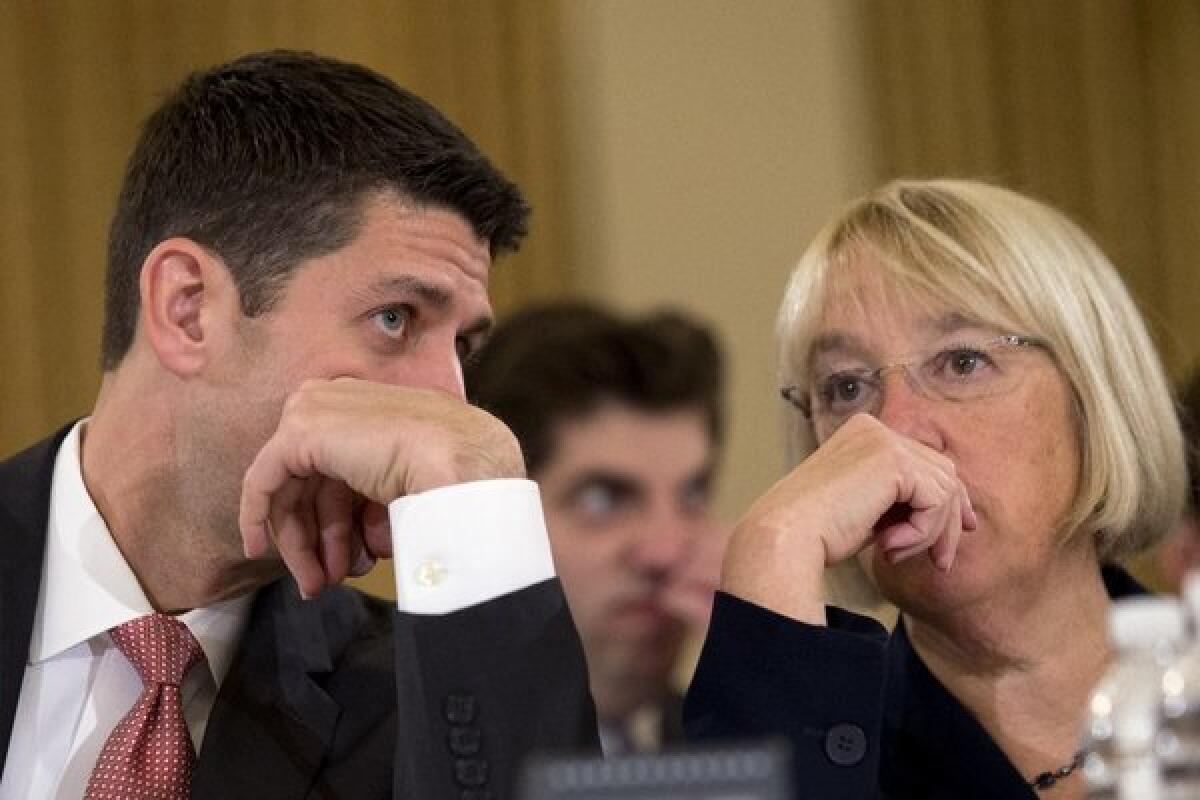The return of the debt limit crisis?

- Share via
Mark Twain wrote of the cat that sat down on the hot stove lid that she would never again sit down on a hot stove lid, but she would never again sit down on a cold one either.
The Republican Party seems to have the opposite tendency: having been burned once by toying with the federal debt limit, it sounds determined to get burned again. Rather than taking more of a lesson from experience than is warranted, like Twain’s cat, it’s poised to take no lesson at all.
That’s the takeaway from House Budget Committee Chairman Paul Ryan’s appearance Sunday on Fox News. Fresh from his supposed victory in crafting a budget compromise with Sen. Patty Murray(D-Wash.) the Wisconsin Republican said his caucus is out to get a pound of fiscal flesh in return for raising the federal debt limit. The current deadline for raising the limit so the U.S. does not risk default on Treasury debt is around Feb. 7, though if experience is a guide it’s likely to slip some.
“We don’t want nothing out of this debt limit,” Ryan said Sunday. “We’re going to decide what it is we can accomplish out of this debt limit fight.” He said the GOP would meet in early January to “discuss exactly what it is we’re going to try and get for this.”
In October, as the House GOP was preparing to fold its hand and end the government shutdown, we speculated that the debt limit was finally dead as a weapon of fiscal politics. Plainly that judgment was premature, in part because we overlooked the old rule that Republicans will always overplay their hand, and the worse the hand the bigger the overreach.
Ryan’s words are a reminder that there’s no reason to have a debt limit at all; it’s an artifact of 1917, when Congress’ idea was to use it to give the Treasury more authority, not less. The lawmakers had grown weary of holding a separate vote every time the government needed to float a bond, so it was deemed easier to give Treasury blanket authority, but not unlimited authority. (We covered this history back in 2011.)
Now some members of Congress seem to want to hold that vote every time. This is foolhardy in the extreme and an utter waste of time. It threatens economic stability and places political issues on the table that have nothing to do with fiscal policy. The energy spent by Treasury officials conjuring up ways to get around the limit could power a small city.
More relevant to Ryan’s comments is that debate over the debt limit paints the debaters as children unworthy of having access to dangerous weaponry. For decades a vote against raising the limit was a quintessential protest vote, because there was never serious doubt the limit would be raised.
October’s standoff over the debt limit and the federal budget was a devastating misplay for House Republicans, who created weeks of economic pain for millions of families and whose public standing plummeted. They’ve been saved, for the moment, by the botched rollout of the Affordable Care Act, which makes Democrats look bad.
It’s possible that Ryan is just feeding his base red meat; the GOP right wing is feeling a little unappreciated at the moment, thanks to House Speaker John Boehner’s recent broadside against the tea party. They need some soothing words.
But if his words signal that the GOP could be poised to snatch defeat back out of the jaws of victory, then it would appear that all that talk about the Ryan-Murray deal marking a new era in congressional effectiveness was balderdash. Could the cat be getting ready to burn its behind again?
More to Read
Sign up for Essential California
The most important California stories and recommendations in your inbox every morning.
You may occasionally receive promotional content from the Los Angeles Times.











